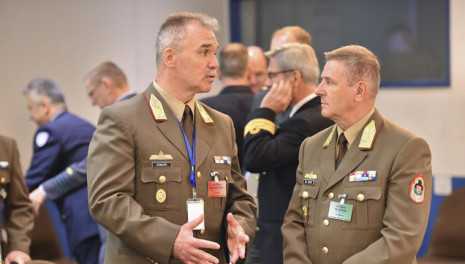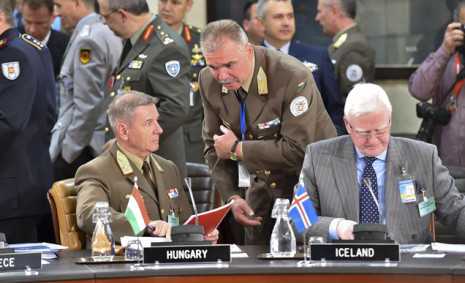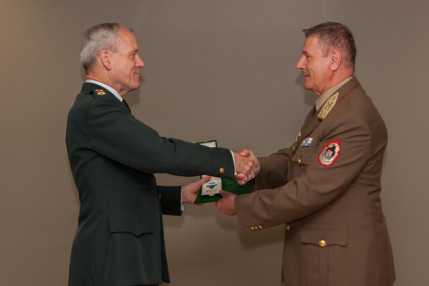NATO Military Committee in Chiefs of Defence Session in May
Szöveg: Defence Staff | 2015. május 25. 9:18Hungary was represented by Chief of Defence Dr. Tibor Benkő, Military Representative Maj.-Gen. László Domján and the designated staff of the HDF Office of the Military Representative at the NATO Military Committee meeting held in Brussels on May 20–21.

High on the agenda of the session was the assessment of the implementation of military tasks in the Readiness Action Plan.
Gen. Knud Bartels, the Chairman of the Military Committee stated that the greatest challenge in implementing the tasks of the RAP is presented by the availability of resources. In his remarks, Gen. Tibor Benkő pointed out that Hungary supports and actively participates in the processes, turning great attention to the development of Pápa Air Base and the tasks of our participation in the Baltic Air Policing Mission as of this September. He announced that according to plans, the Hungarian NATO Force Integration Unit (NFIU) will reach national initial operational capability by the time of the Warsaw Summit, and full operational capability by the end of 2016. In addition to the tasks of adaptation in the RAP and those aimed at increasing response capability, great attention is still paid on NATO’s Resolute Support Mission (RSM) in Afghanistan and the KFOR-led operation in Kosovo.
Accordingly, the Chiefs of Defence discussed current issues in security and military strategy with respect to both operations.
Speaking about the KFOR mission, Gen. Tibor Benkő emphasized that further reduction of the forces can only be implemented if the necessary conditions are in place. He reasserted that Hungary intends to maintain its operational contribution in the future too. During both sessions, Ukrainian Chief of Defence Gen. Viktor Muzhenko informed the military leaders about the crisis in Ukraine, which he referred to as an example of hybrid warfare. He told them that implementation of the terms of the Minsk ceasefire agreement is progressing quite slowly. Speaking about the plans for the reform of the Ukrainian armed forces, he said that the crisis has shown the lack of operational capabilities of the so far underfinanced armed forces, so they are now giving priority to the tasks of modernizing the military.

Gen. Tibor Benkő expressed his appreciation to the people and armed forces of Ukraine for their active contribution to the NATO-led operations and the Hungarian–Romanian–Slovak–Ukrainian “TISA" Multinational Engineer Battalion. He reasserted that Hungary continues to maintain its offers in the field of training courses and medical treatment.
At the MC/CS session with Georgia, Georgian Chief of Defence Maj.-Gen. Vakhtang Kapanadze briefed his counterparts about the current security situation. They discussed the implementation of a substantive package of cooperation measures approved in 2014, which includes a defence capacity building initiative for Georgia. On the margins of the conference, a bilateral meeting was held with the Deputy Chief of Defence of South Korea to discuss the scope of military cooperation in the future.
NATO Military Committee Chairman Gen. Knud Bartels chaired the NATO Military Committee in Chiefs of Defence Session for the last time on May 20–21, 2015. On June 26, 2015 he will hand over his responsibilities to Gen. Petr Pavel, who was Chief of the General Staff of the Czech armed forces until May 4, 2014. In recognition of sustained efforts to strengthen relations between the Hungarian Defence Forces and NATO, Gen. Dr. Tibor Benkő handed over the For the Alliance Medal awarded by the Minister of Defence to Gen. Knud Bartels.

Photos: Defence Staff